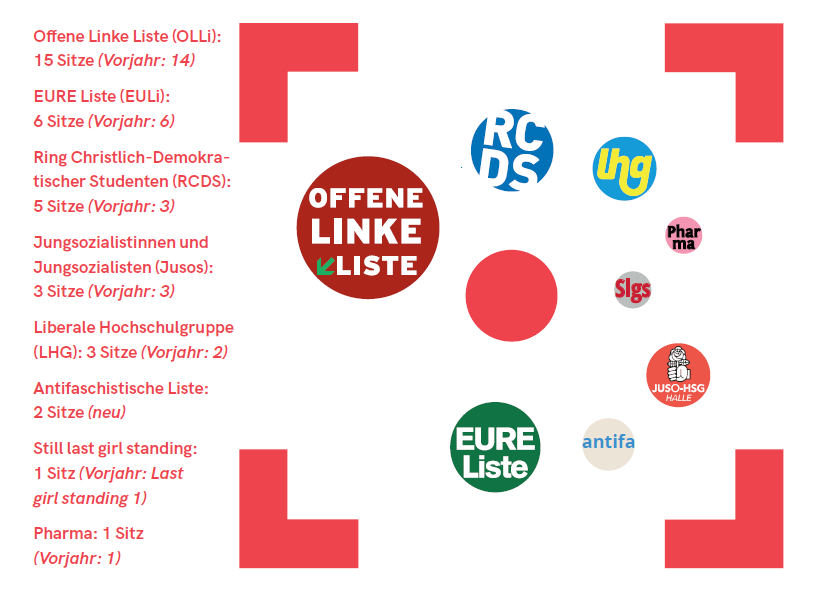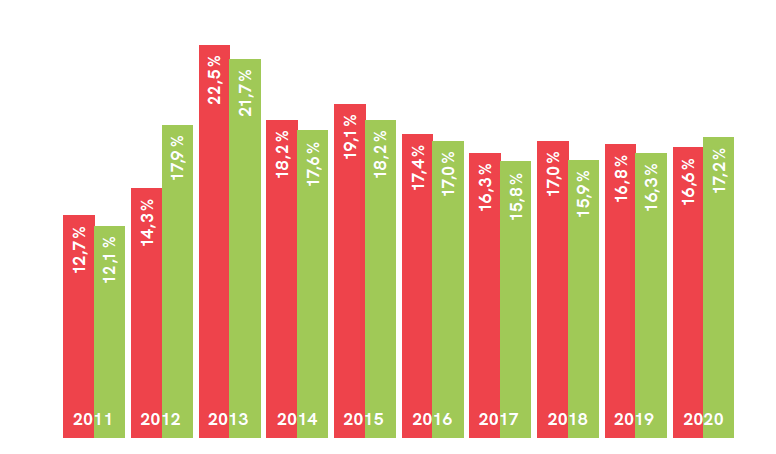The university elections are over, the results have been announced. How did the election go? And above all: How do the groups rate their results?
Those who expected surprises and big changes will be disappointed by the results. At least in terms of seat distribution, the new student council remains similar. The leftist group OLLi (Offene Linke Liste) has gained an additional seat and thus has got fifteen seats in total. The independent group EULi remains the second strongest force with six representatives. The group of Christian Democratic students (RCDS) was able to gain two seats and has become the third strongest faction, with five seats. The socialist group (Juso-HSG), as well as the liberal group (Liberale Hochschulgruppe/LHG) each dispatch three representatives, which means the LHG has gained an additional seat. While the number of independent elected representatives has dropped from six to two people, the anti-fascist group (Antifaschistische Liste/AL) is new in the campaign and was able to secure two seats.

Neither the green group (Grüne Hochschulgruppe; GHG) nor the oppositional right-wing Campus Alternative (CAH) had stood for election. “Hence, the Campus Alternative has finally disappeared formally from this body as well, after two years of inaction”, Lukas Wanke says joyfully. He is a former speaker of the student council and candidate of the OLLi.
The obvious election winner is the OLLi, owning scarcely more seats than the EULi, LHG and RCDS put together. The group assumes that their continuing high stake of seats results in part from their past work and effort in the student council. “By taking on many seats and functions, the OLLi has not only shown a strong presence, but could also actively realize some campaign promises and focal points”, Lukas says.
However, other groups regard the election as a success as well. The RCDS is not only happy about their two extra seats, but is also praising the results of the LHG and EULi. “These gains for the civic camp are encouraging for the future”, Jonathan Sieber says, a vice speaker of the RCDS. He reasons that their gain can be attributed to students who are not content with the work and focus of the student council and who tend to turn towards the RCDS.
The Juso-HSG has voiced their satisfaction, too. During the previous council term they had lost a seat because one of their members had transferred to another group. Effectively they have regained that seat now. Generally, the Juso-HSG speaks of a difficult starting point. The extended council term, resulting from the postponed election date, led to several resignations. Additionally, the group focused their effort on the faculty of law and economics. “It must remain our goal to make offers in more voting areas and faculties during the next election”, says the leading candidate of the Juso-HSG, Felix Hanisch.

Problems during the online election
Covid has accelerated efforts for digitalization everywhere, including the university elections. As reported in our previous issue (“E‑Voting: Jetzt wird online gewählt”), these university elections were the first at the MLU that took place online. Still, there remained an option to participate via postal voting. The new way of casting the vote was met with high expectations. Not only was the turnout expected to increase, but also the results were assumed to be published faster and with less mistakes. However, these hopes were not fulfilled. Not only has the turnout remained much on the same level as in the last years (16.59 %); the relevant department has also faced difficulties with publishing the seat distribution. Thus, the online voting party on 18.12.2020 had to end without announcing the results, which appeared the day after due to technical problems. Additionally, the correction of the results for the open seats of the student council was only published on 08.01.2021.
Steady turnout — lacking interest for university policy?
It is surprising that the turnout shows hardly any change, considering that online elections are actually easier to access and more barrier-free. This lack of change might be due to a number of reasons. While Felix blames the long delay of the election date, the OLLi and RCDS attribute it to the low accessibility of the student body due to Covid, as well as the lack of interest among students. Through the focus on campaigning online, mostly those students were reached who are already interested in university policy. Direct feedback and interaction could not take place on campus, analogue advertising was hard to find. Lukas Wanke points out that the distance to the university has grown in general. For example, students spending the semester at their parent’s home were practically out of reach.
While the RCDS has additionally made use of posters in their campaign and says that feedback has been positive, the Juso-HSG considers this method too expensive and not worth the effort. Other groups seemed to mostly follow the latter line as posters were rarely seen around the campus.
On a different note, the fact that the turnout didn’t dramatically decrease despite the difficult conditions shows the ability of the groups to mobilize their electorate. The campaign was definitely not a bad one, considering the results. All the groups that stood in the election were able to defend or even expand their seats.

Results of the senate election
Besides the student council and the student faculty councils, the student members of the university’s senate and faculty councils were elected, too. For the senate, four groups were able to get one seat each: Students for future, EULi, OLLi, and the RCDS. The LHG had fielded candidates but failed to gather a seat. Students for future stood in the election for the first time and put their focus on the senate election. There they received the most votes of all eligible groups.
You can find detailed results of the student council’s and student faculty councils’ election here: https://www.hochschulwahl.info/wahlergebnisse/
Results for the university senate’s and faculty councils’ election are here: https://wisswei.verwaltung.uni-halle.de/wahlen/senat-fakrat/2535939_3261155/hochschulwahlen_2020/
German Article: https://hastuzeit.de/ihr-habt-gewaehlt-die-ergebnisse-der-onlinewahl/
Translation: Hermine Clara Vultarius, Konrad Dietrich
